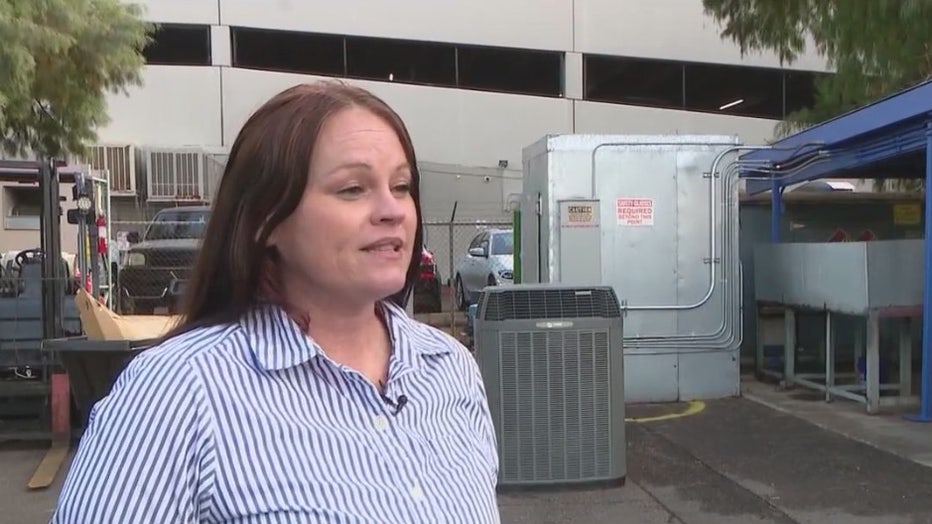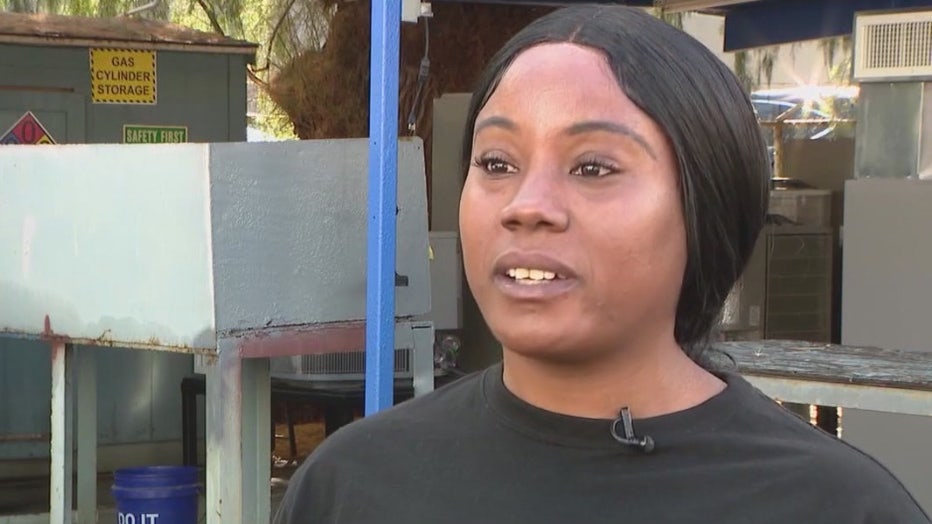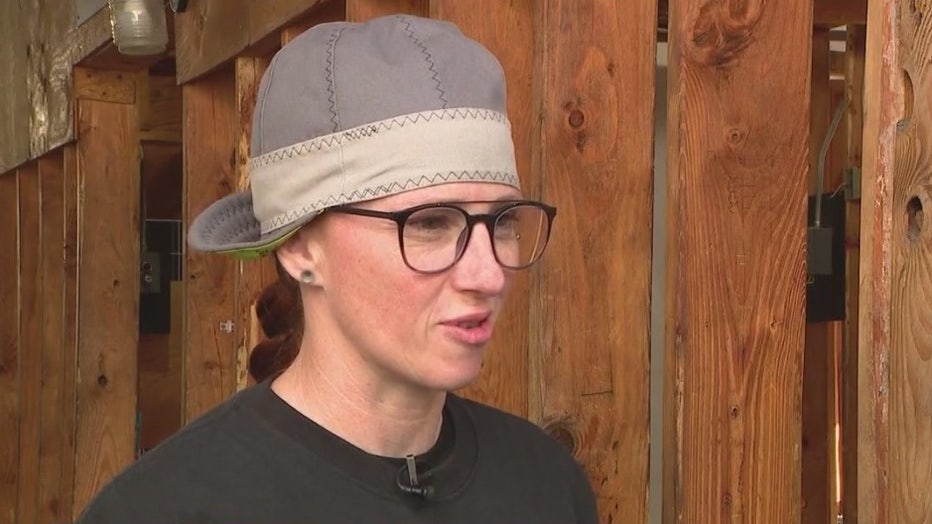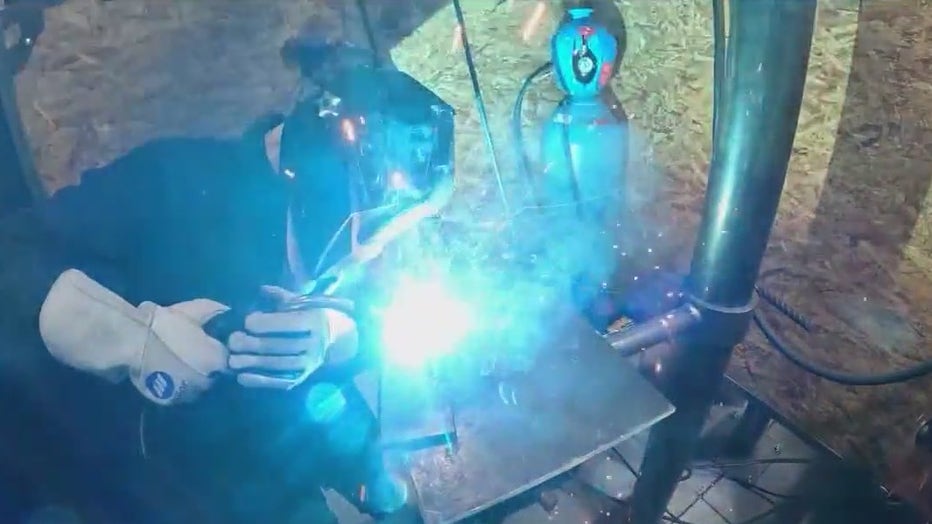Valley nonprofit helps recently released incarcerated women reenter workforce

New skills for second chances l Community Cares
Arouet is a non-profit that empowers women and families impacted by the justice system to build strong communities. Clients are prepared for re-entry in a number of ways, but all of them begin inside prison. FOX 10's Anita Roman has more.
PHOENIX - A Valley nonprofit has teamed up with a local refrigeration school to create a program to help recently released incarcerated women reenter the workforce.
What they're saying:
Samantha Strong never really imagined herself as a welder.
"It's a lot of being comfortable with the position you're in and like, mostly just wrist movement," she said.
But then again, Strong says there are many things in her life that didn't turn out the way she thought they would.
"Um, I mean, I don't want to get into too much detail, but, um, so, you know, I've done time in Perryville and, um, Arouet has helped so much with re-entry and, you know, establishing yourself without your past discriminating you," she said.

Samantha Strong
Neither Samantha, Leeann nor Michelle McDonald wanted to carry their past into their future, let alone, into the present day. It's a big reason they became clients at the Arouet Foundation after their release.
Arouet is a non-profit that empowers women and families impacted by the justice system to build strong communities. Arouet clients are prepared for re-entry in a number of ways, but all of them begin inside prison.
"That's right. We start the process, and then when the women are released, they voluntarily come to Arouet for our post-release services," said Jessica Bruner, business partnership manager with Arouet. "So we offer a variety of pathways for them to successfully reenter through employment, navigation, coaching and development, as well as job placement. We also do financial navigation, development and help them get bank accounts and do credit-building workshops. And then we also have a training and development department where we do certifications like RSI and welding.

Jessica Bruner
Most recently, the Arouet Foundation teamed up with RSI, the refrigeration school in Phoenix, to create a first-of-its-kind welding program for recently released incarcerated women from Perryville Prison.
Samantha, Leeann and Michelle were part of the program.
"So, February, I've been home a year from Perryville Prison," said McDonald. "I did two and a half years there, and through my experience, I gained so much knowledge. I did some self-healing and just trying to find my way again. So, being able to come home and have these amazing organizations that's willing to help us get through those challenges, and they want to see us do better has been amazing."

Michelle McDonald
Part of the healing process, at least for these few select women, is education. Leeann strongly believes knowledge is power.
"I mean, for myself, I just want to make all my dreams come true, really, at the end of the day," she explained. "We have a lot of time spending thinking about our dreams. Right now, however, they do change occasionally, revise. I work in the behavioral health field, so I would like to open my own program. Now, I understand that that is absolutely possible through networking, etc. However, I kind of just want to fund and operate it myself. Learning a skill like this to add to the rest of my skills is going to help me financially gain and maybe find more of like a, I don't know, mid-level career opportunity for myself, something I can go on to later."
"Welding education, trades education, is what we do," RSI instructor Alex Declair said. "We've been doing it actually 60 years, and we've leveraged those skills that we have in education to take it to companies throughout Arizona and really the whole United States. And we really wanted to focus on justice-impacted people and how we can make a difference in their lives because trades is very forgiving, right? And welding is one of those opportunities where people who are justice-impacted come train in a short amount of time and get a really good job. So, I ended up going through those avenues and met Arouet, which is an amazing company and non-profit that helps these women after they get out of prison to reestablish their lives and really reduce recidivism."
Declair explains that the program took 100 hours to complete. The women attended classes three days a week, five hours a day in the evenings.

Alex Declair
"It's given us a lot of hope, especially being in, like, going to a trade school and learning a trade, which is something that you could take with you anywhere," said Michelle. "And those are like you know where you can make good money, and they're forgiving if you know you're not perfect with your record so right and so it's, it's been rewarding to be able to know that like we could take this skill and basically go anywhere with it."
"What I learned while I was incarcerated and my mom helped me figure this out by just being very blunt and kind of stubborn with me is that through addiction, the choices that we make and the situations we get ourselves into, we over time lose our confidence in ourselves," said Leann. "We lose our confident in our abilities and along with that we kind of lose hope. Any determination is out the window, and we lack the motivation to even try. Regardless of this specific program, just any program, being around people, socializing with others, having the opportunity to regain your confidence by learning something new, I think is absolutely key for anyone. Because knowing that you can do something is going to give you the motivation and the determination to go after something else. You can continue to keep doing things."

Leeann
"We want to create successful reentry pathways because we want to reduce the recidivism rate so that we can focus on positive reentry and getting these men and women back to their communities in a positive way," said Bruner. "It's important that they're able to get education. It's important that they are able to find jobs. It's important that they're able to contribute to their communities in a positive manner. Is it possible? Absolutely. Yeah, absolutely. I'm justice impacted. I was released from Perryville in December of 2023. And I did a lot of programming while I was in there. I had a lot of work to do on myself. And coming out, I hit some barriers. I had some struggles. But I kept going and I participated with Arouet. I did all of their reentry services. And eventually, I was given a job here at Arouet to be of service to the next person coming out."
The success rate at Arouet is growing – 549 individuals have been served, 316 were employed.
The lesson here obviously goes beyond welding. These are women who desperately just want a pathway to success. They want to contribute to society in a positive way, and this is a step at making that happen.

Samantha Strong uses her welding skills.
"I knew I was going to be here because I was hungry for change," said McDonald. "You know, at first I didn't have that guidance to help me navigate through life. You know. I was a teen mom, you know, just trying to figure out how to take care of my daughter and, you know, I made a couple of mistakes along the way, but I'm better, and I'm grateful for that. Going to prison was like one of the best things that happened to me because it changed my life completely. I've partnered with so many people. I'm a part of another organization as well. It's able, you're able to be successful after darkness. There's light after every dark situation. And before that, I didn't have confidence in myself because I didn't want to fail. But I didn't know I was gonna fail if I never tried. So just taking that chance on myself and having strong, empowering women around me and just people in general that believe in second chances. We need second chances, it's necessary."

